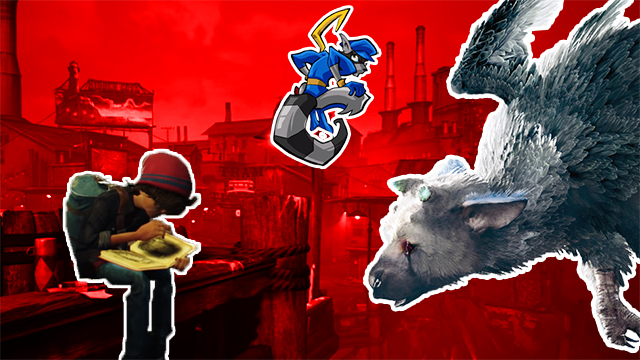Concrete Genie sounds rather promising and while it is seemingly a new experience for developer Pixelopus, no work of art goes without inspiration. And, in this case, some of those inspirations didn’t even reach outside of Sony’s own lineup of games. It takes cues from games like The Last Guardian, Ico, and Sly Cooper in addition to some of the more obvious ones like Jet Set Radio. We recently sat down with Creative Director Dominic Robilliard and Art Director Jeff Sangalli to talk about the game and its influences as well as how Pixelopus learned from its first title, street art, and, of course, Marc Ecko’s weird video game.
GameRevolution: Pixelopus’ last game, Entwined, was an on-rails sort of game, which is completely different from Concrete Genie. Why go in such a drastically different direction?
Dominic Robilliard: One of the things that we felt after reflecting about Entwined was that if we were going to make games with a lot of emotion packed in them and a lot of heart and soul, we wanted to make sure that they were as accessible as possible. We’re really proud of Entwined and because of that unusual mechanic right in the middle of it, it was very difficult for a lot of people.
ALSO: Concrete Genie release date and price revealed
So one of the things that we wanted to do when we were increasing the scope and ambition for our second game was invest in a genre that would allow more people to play more easily. We all love the third-person action adventure games and we thought it would be a great way to evolve what we do as a group and make it easy to access and understand and have access to all of that heart and passion we’ve put into it.
Jeff Sangalli: Our team really has a huge love for games and for making games. It’s definitely the action adventures ones they all gravitate to.
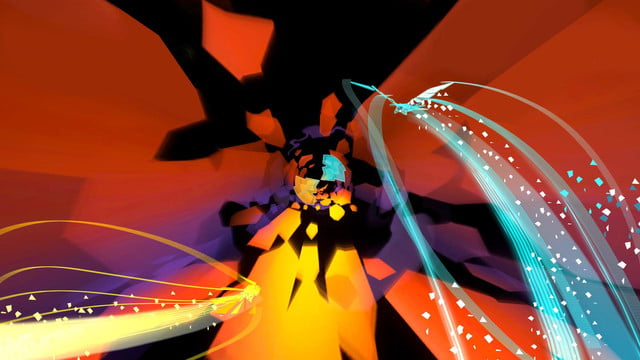
GR: What did you learn from Entwined?
DR: The biggest learning from Entwined and the concepting we did immediately afterwards to discover Concrete Genie was the natural instinct that this team has for making and expressing game ideas that have a message and meaning to them. Like there is some sort of heart encapsulated in those ideas. That was something that really stuck out to Jeff and me after we finished Entwined but then even more after we started concepting for our second game.
That was the learning. Like how to try to cultivate that concept and that idea and it wasn’t until really after [Entwined] that we came up with our team motto: “To make beautiful and imaginative games that have heart.”
JS: Yeah, that’s exactly it. [laughs]
GR: This game is pretty artistically focused. Did you take inspiration from real world street art?
JS: We did. Street art and in particular urban illustration. Not so much the tagging part but the artists that have a strong personal voice with their work where they have a unique style that they are developing. Like the way that they are using it on a building for scale and dramatic impact.
But also children’s book illustrations were also a huge inspiration too because of the handcrafted quality. Using an aerosol can or maker is also handcrafted but we also wanted to make sure it feels like it comes from a young person’s imagination.
DR: The place that I grew up in and the place that our game designer, Jing [Li], grew up in [were quite similar] even though both places were on other sides of the world. I grew up in Bristol, England and that town has a long tradition of illustration and street art that really leverages its communities to make its environment more beautiful and more lively.
Jing also has a similar experience from her hometown in China where they would use kid’s illustrations and put them up around the walls in that town to also have a similar sense of rejuvenation. I never would have expected to have that in common.
GR: How do you put that into the mechanics? Because that is the gamey part.
JS: It took a lot of prototyping a number of years of testing to make sure that everyone could feel like they are an artist. We really wanted to achieve that. So it had to be not laborious but a positive magical experience.
We started with stencils at the wall and then throwing paint. They all had positive merits to them but we really wanted to make it feel like you were driving a paint stroke yourself with the DualShock 4. Those 2D hand-drawn animations led to our engineering team really working that and making sure that was achievable.
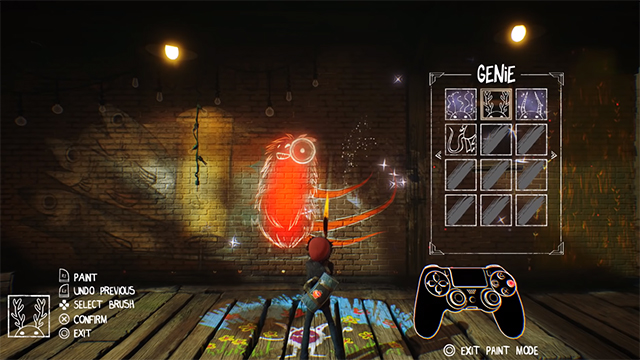
GR: Is that why painting uses the motion controls and not the analog stick?
DR: Correct. There were other versions of the painting mechanics. They were fun and had all kinds of potential but it wasn’t until we could directly acknowledge what you were trying to do and paint on a wall that you were connected to it and had ownership of the artwork and where you could feel like you had made it. So that was the breakthrough.
JS: We also wanted to maintain the gesture of what it’s like to paint.
GR: Did you ever look at a game called Marc Ecko’s Getting Up?
DR: I do remember that game, yes. I enjoyed that game but I don’t remember there being any direct painting mechanics. It was more of a realistic Jet Set Radio.
GR: True. But did you take any inspiration from other games?
DR: There’s quite a long list of games that inspired us. You’ve got some Jet Set Radio in there, a bit of Ico, Infamous, Sly Cooper, and The Last Guardian in terms of the connection between you and your genies. There’s all kinds of different things. We’re super comfortable talking about influences because I think it is important and key to being authentic and talking about the things that inspire you.
But we also wanted to make sure that we were taking it somewhere new. That’s one of the things that we were happy about because these particular painting mechanics with this combination of world and platforming felt like a fresh combination.
GR: So more specifically, can you speak about how Sly Cooper influenced the game?
DR: Probably the biggest thing was the smooth platforming mechanics and the scale of the world. There’s a charm to that world that has something in common with our view on how to make a great platforming environment.
JS: And since Sony Worldwide Studios had a lot to do with Sly Cooper, there’s sort of a DNA that is definitely there.
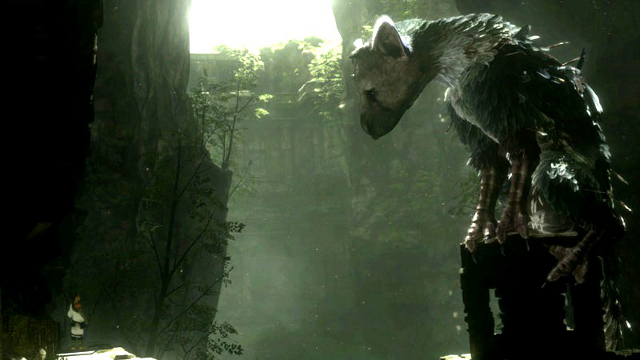
GR: What about The Last Guardian?
DR: One of the breakthroughs that we had when making the genie creation mechanics was that we knew for them to work narratively, they had to feel like the friends Ash wished he had in real life. So emotionally, that was really important to get right. So we knew that we would have to underwrite that relationship with gameplay and that was something that The Last Guardian did incredibly well.
A lot of motivation of the puzzles and having them with you in the game while you are walking around and how they give you Super Paint, that back and forth is our way is writing that relationship with gameplay so you care about them on a gameplay level. That is where all of your instincts come from as a gamer while playing a game.
GR: Speaking of gameplay, Concrete Genie is mostly pretty serene until combat starts. Why make combat in a game like this?
DR: Right from the very beginning — there has literally been a version of that in there since the first prototype we made in 2015 — we realized that when developing the theme, narrative, and story component of the game, we were looking at how to deal with bullying and we knew that we wanted the climax of the story and gameplay to be focused on the negativity itself. So we needed a way to personify bullying as a negative thing that you could lash out at.
We didn’t want it to be about fighting the kids. Because it was really important to have a proper take on bullying but it’s not about them. It’s about what happened to them to turn them into those kids. We also show some of their backstories and explain what has happened to them in their past and what has turned them into the kids that they have become. Again, it’s trying to have that more nuanced take on bullying as a theme. And the combat is about focusing on the darkness and coming at the darkness head on.
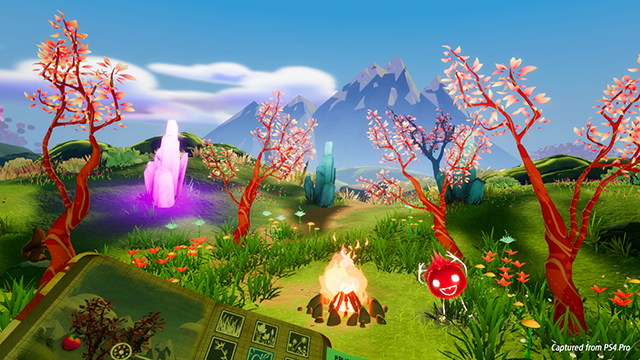
GR: The VR mode is included in this game and is a totally separate mode but has a lot of the same ideas. What made you want to make a VR component to this game and what do you think it brings to the concept?
DR: When we were making the concept, we knew that because it had painting that it would probably be a really cool thing to explore in VR: a first-person painting experience. Back then, there were only 11 or 12 people on the team. We just didn’t have the capacity to develop that ourselves.
And so we reached out to a few of our friends a couple of years ago that we used to work with, Jeff Brown and Dave Smith. Jeff had been working with VR for some time and we showed them the game and they loved it. And they came up with this amazing idea for what they would do if they had the chance to work on a VR experience for it.
And that was this concept of painting and then stepping into your painting and going into the world of the genies and painting all around you in VR, almost like you were 3D sculpting. We liked it so much that we brought them on board. And they’ve been working on that for two years and it’s worked out well.
It brings a wonderful, relaxing, ambient complement to the story. I love the fact that it’s a really intimate way to get close to your painting and offers a version of the game that you can only experience in VR.
